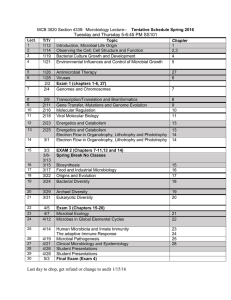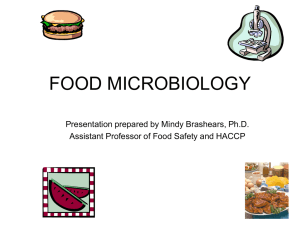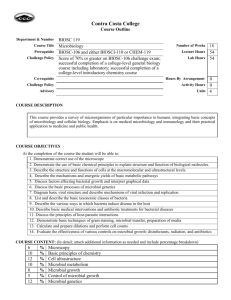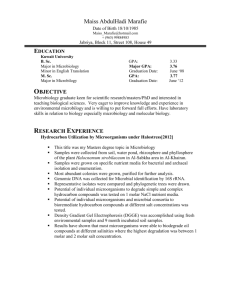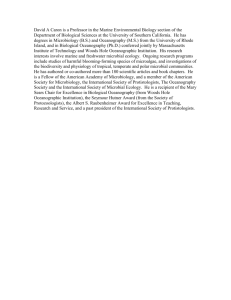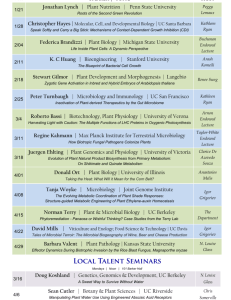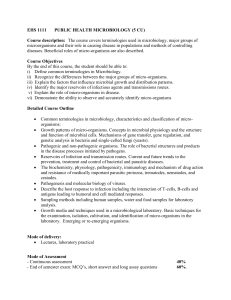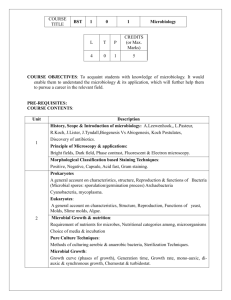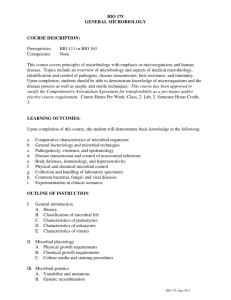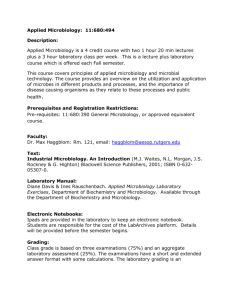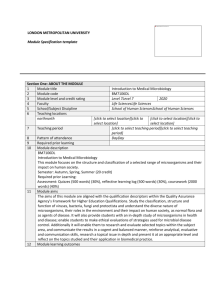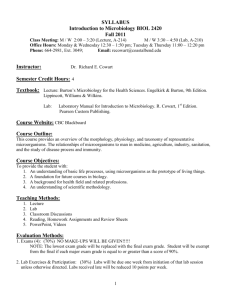Introductory Microbiology, Biol. 1960-1010 - BSU Faculty
advertisement
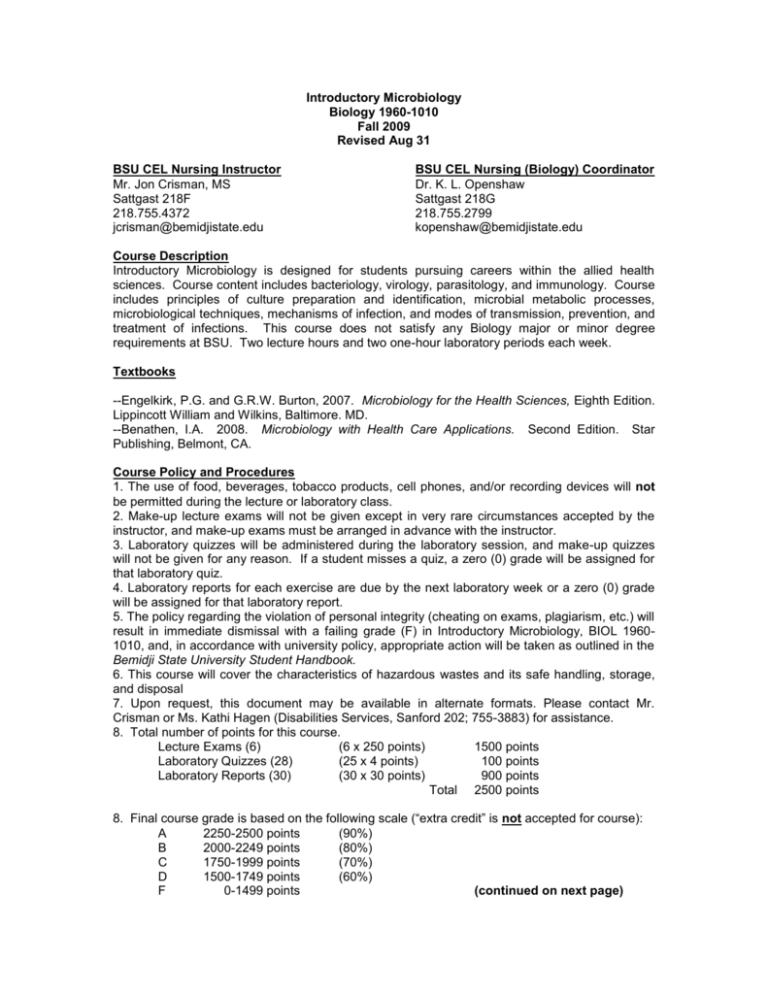
Introductory Microbiology Biology 1960-1010 Fall 2009 Revised Aug 31 BSU CEL Nursing Instructor Mr. Jon Crisman, MS Sattgast 218F 218.755.4372 jcrisman@bemidjistate.edu BSU CEL Nursing (Biology) Coordinator Dr. K. L. Openshaw Sattgast 218G 218.755.2799 kopenshaw@bemidjistate.edu Course Description Introductory Microbiology is designed for students pursuing careers within the allied health sciences. Course content includes bacteriology, virology, parasitology, and immunology. Course includes principles of culture preparation and identification, microbial metabolic processes, microbiological techniques, mechanisms of infection, and modes of transmission, prevention, and treatment of infections. This course does not satisfy any Biology major or minor degree requirements at BSU. Two lecture hours and two one-hour laboratory periods each week. Textbooks --Engelkirk, P.G. and G.R.W. Burton, 2007. Microbiology for the Health Sciences, Eighth Edition. Lippincott William and Wilkins, Baltimore. MD. --Benathen, I.A. 2008. Microbiology with Health Care Applications. Second Edition. Star Publishing, Belmont, CA. Course Policy and Procedures 1. The use of food, beverages, tobacco products, cell phones, and/or recording devices will not be permitted during the lecture or laboratory class. 2. Make-up lecture exams will not be given except in very rare circumstances accepted by the instructor, and make-up exams must be arranged in advance with the instructor. 3. Laboratory quizzes will be administered during the laboratory session, and make-up quizzes will not be given for any reason. If a student misses a quiz, a zero (0) grade will be assigned for that laboratory quiz. 4. Laboratory reports for each exercise are due by the next laboratory week or a zero (0) grade will be assigned for that laboratory report. 5. The policy regarding the violation of personal integrity (cheating on exams, plagiarism, etc.) will result in immediate dismissal with a failing grade (F) in Introductory Microbiology, BIOL 19601010, and, in accordance with university policy, appropriate action will be taken as outlined in the Bemidji State University Student Handbook. 6. This course will cover the characteristics of hazardous wastes and its safe handling, storage, and disposal 7. Upon request, this document may be available in alternate formats. Please contact Mr. Crisman or Ms. Kathi Hagen (Disabilities Services, Sanford 202; 755-3883) for assistance. 8. Total number of points for this course. Lecture Exams (6) (6 x 250 points) 1500 points Laboratory Quizzes (28) (25 x 4 points) 100 points Laboratory Reports (30) (30 x 30 points) 900 points Total 2500 points 8. Final course grade is based on the following scale (“extra credit” is not accepted for course): A 2250-2500 points (90%) B 2000-2249 points (80%) C 1750-1999 points (70%) D 1500-1749 points (60%) F 0-1499 points (continued on next page) Introductory Microbiology Biology 1960-1010 Mr. Jon Crisman Fall 2009 DATE LECTURE TOPIC ENGELKIRK 24 Introduction to Microbiology Chapter 1 25 Microscopy Chapter 2 31 Cell Structure and Taxonomy Chapter 3 01 Cell Structure and Taxonomy Chapter 3 07 Holiday – No Class 08 Diversity of Microorganisms – Viruses 14 Lecture Exam 1--Chapters 1, 2, and 3 15 Diversity of Microorganisms—Bacteria Chapter 4 21 Diversity of Microorganisms—Protozoan and Fungi Chapter 5 22 Biochemistry Chapter 6 28 Lecture Exam 2—Chapters 4 and 5 29 Biochemistry Chapter 6 05 Microbial Physiology and Genetics Chapter 7 06 Microbial Physiology and Genetics Chapter 7 12 Microbial Growth Control—In Vitro Chapter 8 13 Microbial Growth Control—Antimicrobial Agents Chapter 9 19 Lecture Exam 3—Chapters 6, 7, 8, and 9 20 Microbial Ecology Chapter 10 26 Epidemiology and Public Health Chapter 11 Nosocomial Infections and Infection Control Chapter 12 27 Diagnosing Infectious Diseases Chapter 13 02 Lecture Exam 4—Chapters 10, 11, 12, 13 03 Infectious Diseases—Pathogenesis Chapter 14 09 Nonspecific Host Defense Mechanisms Chapter 15 10 Specific Host Defense Mechanisms—Immunology Chapter 16 16 Specific Host Defense Mechanisms—Immunology Chapter 16 17 Major Viral Diseases Chapter 17 23 Lecture Exam 5—Chapters 14, 15, and 16 24 Major Bacterial and Fungal Diseases Chapter 17 30 Major Parasitic Diseases Chapter 18 01 Review 07 Comprehensive Final Lecture Exam—Chapters 1-18 AUG SEPT OCT NOV DEC Chapter 4 (continued on next page) Alternate Lab Schedule; begin Aug 31 Introductory Microbiology Biology 1960-1010 DATE Mr. Jon Crisman Fall 2009 LABORATORY TOPIC BENATHEN AUG 31 Laboratory Safety Microscopy xiii-xviii Ex. 1 SEPT 01 Fungi and Protozoa Ex. 2, 3 07 Holiday—No Class 08 Aseptic Transfer Technique; Case Study 1 Ex. 5 14 Smear Preparation and Simple Stain Ex. 6 15 Bacterial Motility; Begin Commensalism and Synergism Ex. 12, 26, 27 21 Gram Stain; Capsule Stain Ex. 8, 11 22 Complete Commensalism and Synergism Ex. 26, 27 28 Microbes; Pure Culture Isolation Skills Ex. 4, 14 29 Microbes; Pure Culture Isolation Skills Ex. 4, 14 05 Oxygen Requirements; Temperature and Bacterial Growth Ex. 18, 20 06 Oxygen Requirements; Temperature and Bacterial Growth Ex. 18, 20 12 Microbial Growth—Osmotic Pressure and pH Ex. 23, 24 13 Microbial Growth—Osmotic Pressure and pH Ex. 23, 24 19 Hand washing; Antiseptic Agents on Oral/Nasal Flora Ex. 25, 42 20 Hand washing; Antiseptic Agents on Oral/Nasal Flora Ex. 25, 42 26 Antibiotic Sensitivity Testing; Beta-Lactamase Activity Ex. 41, 43 27 Antibiotic Sensitivity Testing; Beta-Lactamase Activity Ex. 41, 43 02 Microorganisms—Chemical Control; Oligodynamic Action Ex. 40, 44 03 Microorganisms—Chemical Control; Oligodynamic Action Ex. 40, 44 09 Microbiology—Food and Milk Ex. 30, 31 10 Microbiology—Food and Milk Ex. 30, 31 16 Soft Tissue Infection Model; Lethal Action of Lysozyme Ex. 46, 47 17 Soft Tissue Infection Model; Lethal Action of Lysozyme Ex. 46, 47 23 Staphylococci on Skin; Snyder Test for Dental Caries Ex. 48, 52 24 Staphylococci on Skin; Snyder Test for Dental Caries Ex. 48, 52 30 Urinary Tract Infections Ex. 51 01 Urinary Tract Infections Ex. 51 OCT NOV Dec
